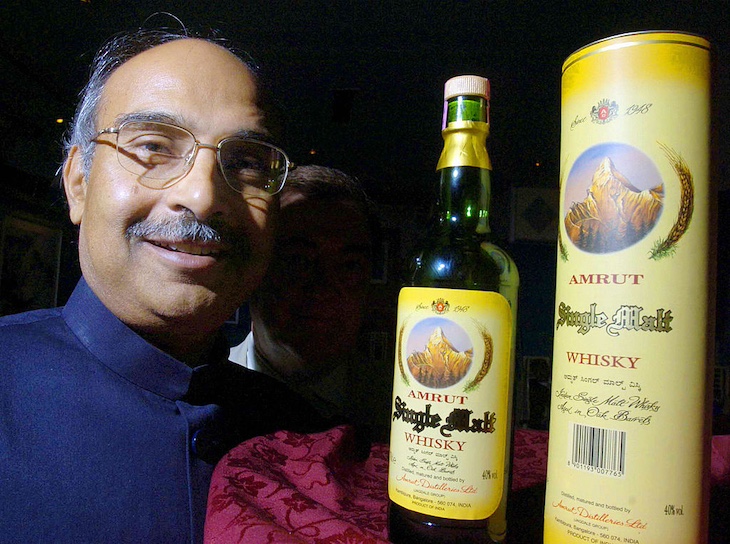Indians drink a lot of Scotch whisky. In 2023 the country overtook France to become the largest market for Scotch in terms of volume, according to the Scotch Whisky Association. But could the world’s largest whisky market be about to transfer its allegiance?
Donald Trump is certainly hoping so. Last week, on Valentine’s Day no less, talks between the US President and Indian Prime Minister Narendra Modi led to the lowering of Indian tariffs on Bourbon from 150 to 100 per cent (Scotch whisky, despite some spirited lobbying by the British government, remains at 150 per cent).
Yet despite this, the real rival for the affections of the Indian middle classes is not bourbon, but the country’s fast improving domestic products.
While the Scotch whisky industry often seems a bit embarrassed by the Highland or imperial tropes used to sell its products in the past, India has no such qualms. The bestselling Indian whiskies are called things like Royal Stag, Imperial Blue and Officer’s Choice. It’s like the Raj never ended.
In the past, they were made from imported malt whisky from Scotland diluted with molasses-based spirit, so they were not even allowed to be sold as whisky in Britain, Europe or America. But now the country is producing increasingly good single malts, often with the help of Scottish consultants like Charlie Smith, formerly of Diageo. He’s also my uncle and mentioned to me how good the whisky was these days even though health and safety standards still left much to be desired.
The country has a whisky heritage richer than Japan’s. In 1855 Edward Abraham Dyer founded Kasauli distillery in Himachal Pradesh in Northern India. The company behind Rampur single malt was founded in 1943 while Amrut was founded in 1948.
It was Amrut that first showed the world that Indian whisky had come of age when it launched its single malt in Glasgow (a brave place to launch a non-Scottish whisky) in 2004. The watershed moment though came in 2010 when Jim Murray’s Whisky Bible named Amrut Fusion as the third-best whisky in the world. It’s been joined by brands such as Rampur in Bangalore, Paul John in Goa and most controversially, Indri. This last brand comes from Piccadilly Distillers, a company owned by Siddharth Sharma who was imprisoned in 1999 for shooting dead Jessica Lal, a barmaid who refused to serve him a drink. He is now planning to build a distillery in Scotland.
There are now whisky distilleries all over the country, from the baking heat of the south where the whisky matures six times faster than in Scotland, to the cool of Kashmir and the Himalayas.
The industry has some way to go before it fully supplants Scotch, which has a long and deep relationship with the subcontinent. Johnnie Walker had agents in British India which Dr Nicholas Morgan, who wrote a history of the company called A Long Stride, described as ‘James Bond-type figures, smooth, smart and could drink you under the table.’ The officers and sahibs drank Johnnie Walker and other premium brands while the locals had cheaper whiskies. Officer’s Choice, the largest spirits brand in the world, plays on this history.
Following independence and partition in 1947, Johnnie Walker developed a cult following among ordinary Indians despite, or maybe because of, the high tariffs slapped on the product. Today a bottle of Black Label costs around $30 in America but at least $75 in India, often more, as the various states of India have their complicated systems of tariffs. No Indian wedding is complete without a bottle of Johnnie Walker on each table, with some splashing out on the top-of-the-range Blue Label which can cost up to $500. It’s about conspicuous consumption.
Even those who have never tasted Johnnie Walker know the brand as ‘Uncle Johnnie’. It’s such a part of the culture that the late Indian actor Badruddin Jamaluddin Kazi changed his name to Johnny Walker. He was famous for playing drunks – though as an observant Muslim he never touched a drop.
Even in Pakistan, Johnnie Walker is freely available for the right price. Pakistani-American musician Basim Usmani said Black Label was ‘a more important Western import than trains, so-called secularism, or “democracy”.’ The American journalist Seymour Hersh reminisced about his time in Pakistan where the ‘military officers, politicians, and journalists routinely served Johnnie Walker Black during our talks, and drank it themselves.’
Scotch whisky is also huge among the subcontinent’s diaspora. Indians and especially Sikhs are prominent in the British spirits industry. The Whisky Exchange, the country’s biggest online drinks retailer, was founded by two Sikh brothers from Hanwell in West London, Sukhinder and Rajbir Singh, before they sold it to Pernod Ricard in 2021.
Still, according to Ipe Jacob, who runs Maharaja Drinks importing Indian produce to Britain, previously ‘everything foreign-branded was considered superior’, but this is beginning to change as Indian whisky drinkers wake up to the quality of domestic products.
It may be a while before Indians fully give up on the cult of Johnnie Walker, but perhaps soon there’ll be a bottle of Amrut Fusion on the table of every Indian wedding.
Henry Jeffreys, with Tom Parker Bowles, is the host of the Intoxicating History podcast.







Comments